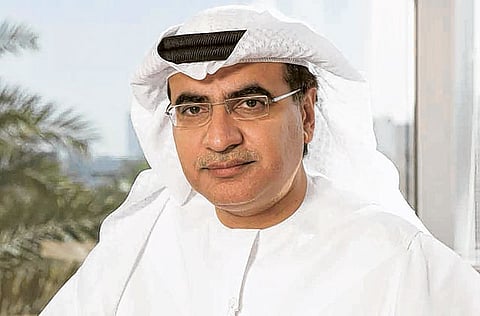DMC marks unparalleled growth as it celebrates its tenth anniversary
Dubai Media City has helped build media industry in UAE, cluster's top official says

Dubai: The Dubai Media City is celebrating a decade of evolution, from an ambitious idea to an international touchstone for communications.
The DMC, a member of Tecom Investments' Media Cluster owned by Dubai Holdings, celebrated its tenth anniversary recently, marking the unparalleled growth of a community of media and media-related companies in the region.
A sanctuary
Mohammad Abdullah, managing director for media cluster at Tecom Investments, said DMC has morphed into a sanctuary where creative media enterprises in "publishing, music, film, new media, leisure and entertainment, broadcasting, media and marketing services and information agencies thrive.
"The facility offers an environment that allows companies and individuals to operate with synergy and freedom," he told Gulf News. Forged in January 2001 with an initial tenant list of 99 media companies, Dubai Media City "now has a total of 1,400 companies and hundreds of freelancers as part of the cluster," he said.
"The number of workers in the media cluster's various zones as of April 2010 is 16,945."
Gulf News: Why was Dubai Media City started? What was its original mission? Has it accomplished that?
Mohammad Abdullah: Dubai Media City was one of the initial projects that were launched to promote Dubai government's vision in diversifying its economy by establishing new knowledge-based business clusters. Over the past 10 years Dubai has developed into a unique global media community that provides a strong regional platform for media companies.
This is further exemplified by Dubai Media City that has expanded exponentially to include a media community of regional and international companies. It has evolved into a major regional media hub, hosting prestigious global brands. Currently, more 1,400 companies and hundreds of freelancers are part of its distinctly elite media eco-system. While supporting our business partners, we have continuously improved the value-added services provided to ensure the highest level of customer satisfaction.
The presence of major names like BBC, Thomson Reuters, Dow Jones and the latest addition CCTV has proved the relevance of DMC in the media industry. This is also an achievement for the cluster as we have been able to create a community of like-minded professionals coming from across the globe and the region. As a media cluster, we have also made sure to pass on this knowledge and expertise to the growing group of young media professionals.
How have the entry of so many media partners into Dubai benefited the emirate and the country? Has it helped to put Dubai on the world map?
DMC's contribution has been in building and contributing to the growth of the media industry in UAE. Major multinational corporations have set base at the cluster to conduct business in the region.
Additionally we have been able to also influence and support growth of young UAE talent which is the main pillar of development and growth in UAE. These talented individuals will be tomorrow's business leaders and government representatives therefore we must be able to provide them with the tools required to develop solutions and their path for the future.
This is essential to maintain Dubai's leading position in the region and put it on the world map.
What are the future plans of DMC administrators to further expand the reach of Dubai Media City?
Moving forward the focus will remain on improving satisfaction levels of our current customer base. The free zone also emphasise on refining the services provided to its community by applying best international practices.
The cluster would look at actively engaging business partners by helping them expand their opportunities in the region. DMC will also continue to support young entrepreneurs and innovators in the media supporting them on new platforms for growth."
Is the future bright for DMC and its companies?
The media environment in the Middle East region is rapidly changing, buoyed by new satellite channels, the internet and new media offering more choice, alternative information and encouraging industry reforms. Investors across the new media value chain are particularly looking at areas such as content creation and delivery.
Investments in infrastructure such as the access network and media production facilities throughout the region are set to provide key connectivity for these new broadband services. The ease-of-use and responsiveness of these services are key factors in creating successful revenue generating media products.
Regional content producers and distributors, broadband network operators and smart-city infrastructure investors currently are presented with the opportunity to exploit the commercial potential of these services in the region by establishing their presence to drive the development of domestic infrastructure.
With the media poised to serve as a platform to promote public debate, transparency, accountability and respect for diversity of views and opinions, the time is now right for international industry leaders to explore fresh areas of opportunity in the Middle East.
The entry of big global media leaders will definitely spur the development of the nascent regional industry. The media business model is changing and there are many opportunities where technology can unlock value for companies in the Arab world.
New product platforms are created for the benefit of the consumer. The region also benefits from the technology that is brought in by global leaders.
The co-operation has so far managed to expand the boundaries of media content through the support of youth television and the training of media professionals in film-making and investigative journalism. We believe their presence will help the regional industry develop further.
Have other countries emulated DMC after seeing the huge success experienced here in Dubai?
The growth potential of the media industry is not limited to UAE borders but is also seen in countries like Saudi Arabia and Qatar. Media houses are looking at expanding their outreach across the gulf targeting audiences from different industry segments.



